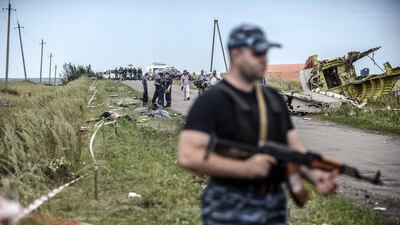WASHINGTON // The US has turned up the heat on Russia for its support of Ukrainian separatists blamed for shooting down a Malaysian passenger plane that killed 298 people.
In some of the Obama administration’s harshest criticism of Moscow since the crisis in Ukraine began earlier this year, Secretary of State John Kerry outlined Washington’s case that the pro-Russian separatists are to blame for the downing of the aircraft and that Russia was almost certainly complicit.
He demanded that Russia act immediately to rein in the rebels and to actively support a transparent investigation into what happened to the plane.
“This is the moment of truth for Russia,” Mr Kerry said.
“Russia is supporting these separatists. Russia is arming these separatists. Russia is training these separatists, and Russia has not yet done the things necessary in order to try to bring them under control.”
In a round of television interviews, Mr Kerry cited a mix of US intelligence and social media reports that he said “obviously points a very clear finger at the separatists” for firing a Russian-provided SA-11 surface-to-air missile that brought the plane down killing everyone on board.
The US embassy in Kiev confirmed on Sunday the authenticity of intercepted phone conversations released by Ukraine’s security service of pro-Russian rebels discussing how they shot down Malaysian airliner MH17.
Ukraine’s SBU security agency had earlier released recordings of what it claimed were phone talks involving rebels and a Russian military intelligence officer admitting that they had hit the passenger jet after mistaking it for a military aircraft.
Video of an SA-11 launcher — with one of its missiles missing and leaving the likely launch site — has been authenticated, Mr Kerry said.
“It’s pretty clear that this is a system that was transferred from Russia into the hands of separatists,” he said.
Mr Kerry added that separatists had shot down about 12 aircraft over the past month, and had bragged in the phone intercepts about Thursday’s attack until they realised it was a commercial jet.
He called on Russian president Vladimir Putin to live up to his commitment to press for a full and independent international investigation into the jet’s downing and use his influence with the separatists who have taken the plane’s black box flight recorders, removed the victims’ bodies and “seriously compromised” the crash site.
“This is an insult to everybody,” he said.
Pro-Russian militiamen in Ukraine loaded almost 200 bodies from the downed flight MH17 into refrigerated train wagons on Sunday.
The key question of who controlled the collection of evidence at the sprawling crash site in rebel-held territory dominated the day’s rapid-fire developments.
International monitors say armed rebels have limited their access to the crash site and Ukrainian officials said armed rebels took the bodies away from their workers by force.
Insurgents said they had in hand material resembling black boxes but promised to give them to “international investigators if they arrive”.
They were also holding the bodies in refrigerated carriages until “the experts arrive”, said a rebel chief who explained that fighters had moved scores of bodies “out of respect for the families”.
“We couldn’t wait any longer because of the heat and also because there are many dogs and wild animals in the zone,” said Alexander Borodai, prime minister of the self-proclaimed Donetsk People’s Republic.
OSCE spokesman Michael Bociurkiw described the stench at Torez station, where armed separatists were guarding the grisly cargo of corpses, as “almost unbearable”.
The bodies, some dismembered and charred, had been left rotting in cornfields amid the blackened piles of mangled wreckage of the plane at the main crash site in Grabove, with debris spread out for kilometres.
Mr Kerry said he was hopeful that the shoot-down would galvanise support in Europe for increasing sanctions on Russia over its overall actions in Ukraine.
“We hope this is a wake-up call for some countries in Europe that have been reluctant to move,” Mr Kerry said, recalling that President Barack Obama had signed off on a new round of sanctions on Russia the day before the plane went down Thursday.
On Sunday, British prime minister David Cameron said in an unusual front-page piece in the Sunday Times that there is growing evidence that separatist rebels, backed by Russia, shot down the aircraft.
“If President Putin does not change his approach to Ukraine, then Europe and the West must fundamentally change our approach to Russia,” Mr Cameron wrote.
Mr Cameron, French President Francois Hollande and German Chancellor Angela Merkel demanded that Mr Putin force separatists controlling the crash site to “finally allow rescuers and investigators to have free and total access to the zone”.
If Russia fails “to immediately take the needed measures, consequence will be drawn” at an EU foreign ministers meeting set for Tuesday, said Mr Hollande.
* Associated Press and Agence France-Presse

